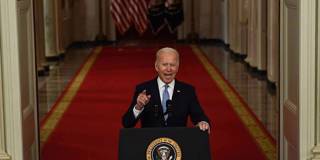It was already clear that former President Donald Trump repudiated the humanitarian or quasi-humanitarian motives that underpinned US military interventions after the Cold War. But Joe Biden’s forceful renunciation of foreign-policy idealism is somewhat surprising.
CHICAGO – US President Joe Biden’s speech defending the withdrawal from Afghanistan announced a decisive break with a tradition of foreign-policy idealism that began with Woodrow Wilson and reached its apex in the 1990s. While that tradition has often been called “liberal internationalism,” it also was the dominant view on the right by the end of the Cold War. The United States, according to liberal internationalists, should use military force as well as its economic power to compel other countries to embrace liberal democracy and uphold human rights.

CHICAGO – US President Joe Biden’s speech defending the withdrawal from Afghanistan announced a decisive break with a tradition of foreign-policy idealism that began with Woodrow Wilson and reached its apex in the 1990s. While that tradition has often been called “liberal internationalism,” it also was the dominant view on the right by the end of the Cold War. The United States, according to liberal internationalists, should use military force as well as its economic power to compel other countries to embrace liberal democracy and uphold human rights.